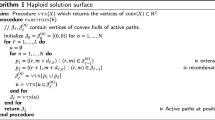Abstract
The problem of haplotype inference under the Mendelian law of inheritance on pedigree genotype data is studied. The minimum recombination principle states that genetic recombinations are rare and haplotypes with fewer recombinations are more likely to exist. Given genotype data on a pedigree, the problem of Minimum Recombination Haplotype Inference (MRHI) is to find a set of haplotype configurations consistent with the genotype data having the minimum number of recombinations. In this paper, we focus on a variation of the MRHI problem that gives more realistic solutions, namely the k-MRHI problem, which has the additional constraint that the number of recombinations in each parent-offspring pair is at most k. Although the k-MRHI problem is NP-hard even for k = 1, the k-MRHI problem with k > 1 can be solved efficiently by dynamic programming in \(O(nm^{3k+1}_{0}2^{m0})\) time by adopting an approach similar to the one used by Doi, Li and Jiang on pedigrees with n nodes and at most m 0 heterozygous loci in each node. In particular, the 1-MRHI problem can be solved in \(O(nm^{4}_{0}2^{m0})\) time. We propose an O(n 2 m 0) algorithm to find a node as the root of the pedigree tree so as to further reduce the time complexity to O(m 0 min(t R )), where t R is the number of feasible haplotype configuration combinations in all trios in the pedigree tree when R is the root. If the pedigree has few generations, the 1-MRHI problem can be solved in \(O(min\{nm^{4}_{0}2^{m0}, nm^{l+1}_{0}2^{\mu R+l}\})\) time, where μ R is the number of heterozygous loci in the root, and l is the maximum path length from the root to the leaves in the pedigree tree. Experiments on both real and simulated data confirm the out-performance of our algorithm when compared with other popular algorithms. In most real cases, our algorithm gives the same haploty** results but runs much faster. In some real cases, other algorithms give an answer which has the least number of recombinations, while our algorithm gives a more credible solution and runs faster.
Access this chapter
Tax calculation will be finalised at checkout
Purchases are for personal use only
Preview
Unable to display preview. Download preview PDF.
Similar content being viewed by others
References
The CEPH genotype database, http://www.cephb.fr/
Clark, A.G.: Inference of haplotypes from PCR-amplified samples of diploid populations. Mol. Biol. Evol. 7(2), 111–122 (1990)
Dausset, J., Cann, H., Cohen, D., Lathrop, M., Lalouel, J.M., White, R.: Centre d’etude du polymorphisme humain (ceph): collaborative genetic map** of the human genome. Genomics 5, 575–577 (1990)
Doi, K., Li, J., Jiang, T.: Minimum recombinant haplotype configuration on tree pedigree. In: Benson, G., Page, R.D.M. (eds.) WABI 2003. LNCS (LNBI), vol. 2812, pp. 339–353. Springer, Heidelberg (2003)
Griffiths, A., Gelbart, W., Lewontin, R., Miller, J.: Modern Genetic Analysis: Integrating Genes and Genomes. W.H. Freeman and Company, N.Y. (2002)
Gusfield, D.: Inference of haplotypes from samples of diploid populations: complexity and algorithms. J. Computational Biology 8, 305–323 (2001)
Li, J., Jiang, T.: Efficient inference of haplotypes from genotypes on a pedigree. J. Bioinfo Comp. Biol. 1(1) (2003)
Li, J., Jiang, T.: Efficient inference of haplotypes from genotypes on a pedigree. In: Proc. of RECOMB 2003, pp. 197–206 (2003)
Litt, M., Kramer, P., Browne, D., Gancher, S., Brunt, E.R.P., Root, D., et al.: A gene for episodic ataxia/myokymia maps to chromosome 12p13. Am. J. Hum. Genet. 55, 702–709 (1994)
Murray, J.C., et al.: A comprehensive human linkage map with centimorgan density. Science 265, 2049–2054 (1994)
O’Connell, J.R.: Zero-recombinant haploty**: applications to fine map** using snps. Genet. Epidemiol. 19 (2000)
Qian, D., Beckmann, L.: Minimum-recombinant haploty** in pedigrees. Am J. Hum. Genet. 70(6), 1434–1445 (2002)
Russo, E., et al.: Single nucleotide polymorphism: Big pharma hedges its bets. The Scientist 13 (1999)
Stephens, M., Smith, N.J., Donnelly, P.: A new statistical method for haplotype reconstruction for population data. Am. J. Hum. Genet. 68, 978–989 (2001)
Tapadar, P., Ghosh, S., Majumder, P.P.: Haploty** in pedigrees via a genetic algorithm. Hum. Hered. 50(1), 43–56 (2000)
Author information
Authors and Affiliations
Editor information
Editors and Affiliations
Rights and permissions
Copyright information
© 2005 Springer-Verlag Berlin Heidelberg
About this paper
Cite this paper
Zhang, Q., Chin, F.Y.L., Shen, H. (2005). Minimum Parent-Offspring Recombination Haplotype Inference in Pedigrees. In: Priami, C., Zelikovsky, A. (eds) Transactions on Computational Systems Biology II. Lecture Notes in Computer Science(), vol 3680. Springer, Berlin, Heidelberg. https://doi.org/10.1007/11567752_7
Download citation
DOI: https://doi.org/10.1007/11567752_7
Publisher Name: Springer, Berlin, Heidelberg
Print ISBN: 978-3-540-29401-6
Online ISBN: 978-3-540-31661-9
eBook Packages: Computer ScienceComputer Science (R0)




